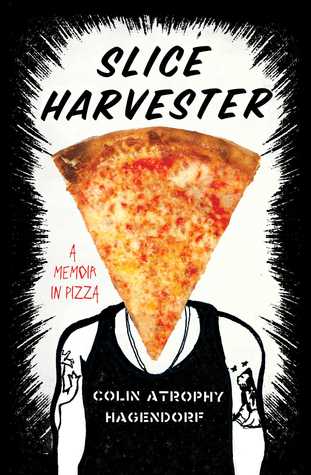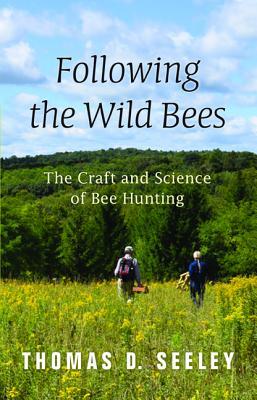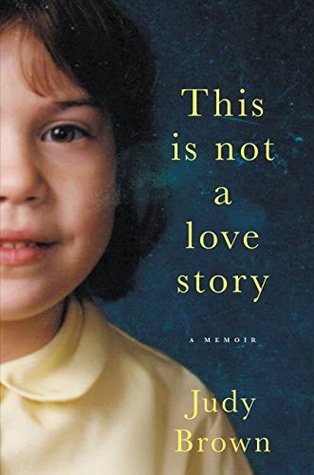
Slice Harvester: a Memoir in Pizza by Colin Atrophy Hagendorf
The review I read of this sold it like Colin Hagendorf was able to get through his drug and alcohol addiction by starting the Slice Harvester blog/zine and eating a piece of pizza at every pizza place in New York City. But, he only started to turn his life around in the last 2 chapters. The rest of the book was him eating pizza while being constantly hungover from his insane drinking. His life was such a disaster that it made the book pretty depressing and sad. The pizza seemed like an afterthought in the book with page after page of how f*@ked up his life was. I also really wonder about his girlfriend who met him right before Slice Harvester began and stuck around for 2 years of him being drunk almost all the time and treating her like crap. The book was also very vulgar for seemingly no other reason that to be vulgar. I did NOT like this one and would not recommend it. The only decent chapter was chapter 10 about Pizza Suprema. Instead of wasting your time with this terrible book do your own local "slice harvest" to find the best pizza in your area.

All the Light We Cannot See by Anthony Doerr (Books & Banter and Evening Edition book clubs)
I re-read this book because both of my book clubs selected for the month. I was excited to re-read it because I loved it so much the first time. I definitely loved it just as much reading it again and there were more things I noticed this time because I already knew what happened so I wasn't just blowing through it so fast. I don't think I really understood the title until this time. Werner is so affected by the records that Marie-Laure's great-uncle plays and a quote from the records says "What do we call visible light? We call it color. But the electromagnetic spectrum runs to zero in one direction and infinity in the other, so really, children, mathematically, all of light is invisible." (p. 53) All the light we cannot see is both everything Marie-Laure can't see because she's blind and all the electromagnetic waves in the radio frequencies that Werner detects and understands. I'm just blown away again at this incredibly well-written book. (from reading May 3-6, 2016)

Following the Wild Bees by Thomas Seeley
I'm trying to read more books about bees and beekeeping since we're planning to get bees next spring. This book covers an aspect of bees I wasn't familiar with before - hunting for wild bee colonies. The author is a scientist who has done multiple scientific studies about bees and their habitats, etc. In doing so he discovered bee hunting. While it seems very interesting - it also seems pretty time-consuming and complicated with lots of math and calculating to find where the wild bee hive is located. I think it could be interesting, but I don't really know who has time to spend DAYS out in the woods looking for wild bee hives! I'm very interested in bees, but I don't think this is something I'll personally try. I did like that at the very end he talks about how to set up a bait hive to capture swarms - that is something I could see myself trying out down the road.

Early One Morning by Virginia Baily
Based on the synopsis of this book that I read it sounded great - an Italian woman impulsively takes a Jewish child who is being carted away with his family and saves his life. But, the actual book was very disappointing. The storyline goes back in forth in time, but there is no indication of the time frame in the chapter heading so it was often confusing what time period was being described. Also, while Chiara does an incredible act the whole time she is caring for Daniele there is nothing but problems and everything seems to go wrong. 30 years after rescuing Daniele, Chiara gets a call from a teenage girl claiming to be Daniele's daughter. Chiara decides to confront her painful past with Daniele for the sake of his daughter. The whole book is really depressing and sad with NO HOPE in sight, then somehow in the end the author ties up everything for this perfect happy ending - it just didn't work with the rest of the book.
Maybe because I just finished re-reading All the Light We Cannot See which takes place during the same time period (and is MUCH, MUCH better), but I was so disappointed with this one. I would NOT recommend this one at all.
Maybe because I just finished re-reading All the Light We Cannot See which takes place during the same time period (and is MUCH, MUCH better), but I was so disappointed with this one. I would NOT recommend this one at all.

This is Not a Love Story by Judy Brown
When Judy Brown was growing up she was constantly embarrassed by her younger brother Nachum. Their family was ultraorthodox Chassidic Jews and in the late 1980's autism wasn't really on many people's radars, but especially in this insular community. Nachum couldn't speak and would freak out over loud noises or if touched. Judy constantly prayed that God would fix her brother or at least take him away. Their mother devotes her life to getting Nachum help finally sending him to live in Israel with family and that is where after years he is finally diagnosed as autistic and gets the therapy and help he needs. Within a few years of his diagnosis he can read and write and speak. After being away from her brother for 6 years when Judy first goes to visit him she "...realized that He [God] had never said no. He had only said, 'Wait.'"(p. 295) Judy starts to develop a real relationship with Nachum and begins to see their childhood in a different light now that she understands more about autism. The book kind of dragged on in the middle when she was SO caught up in being embarrassed by her brother, but the end made the whole book. The relationship they have and her love for him shines through. Growing up with a severely autistic sibling would be hard for anyone, but I think it was even harder because of their ultraorthodox community where the common practice was to send away any "imperfect" children. The fact that their parents didn't do that says a lot about them.
In the info about her in the back of the book it says that she left Chassidism after being revealed as the author of a controversial book. I'm curious to know about that experience and maybe she'll write another book about that journey.
In the info about her in the back of the book it says that she left Chassidism after being revealed as the author of a controversial book. I'm curious to know about that experience and maybe she'll write another book about that journey.

Food Whore by Jessica Tom
Tia Monroe just started graduate school in the Food Studies program at NYU. She feels certain that if she can get an internship with her idol Helen Lansky that her food writing dreams will come true. But, at the Food Studies reception her chance with Helen is interrupted and she doesn't get the internship. Instead she's approached by Michael Saltz, the legendary New York Times restaurant critic. Apparently he's lost his sense of taste and wants her to be his ghost palate. Tia jumps at the chance thinking this can only lead to better things. But, seeing her words under Saltz's name makes her feel cheap and lying to everyone in her life starts to take a toll too. Eventually, she has to decide whether to forge her own path or trust that Saltz really has her best interests in mind.
This was a fun, quick, Chick-lit read. While parts of the story were predictable, overall it was good. I would read another book by Jessica Tom.
This was a fun, quick, Chick-lit read. While parts of the story were predictable, overall it was good. I would read another book by Jessica Tom.

A Deadly Wandering by Matt Richtel
In September 2006 on a remote highway in Utah Reggie Shaw is driving to work. While driving he is also texting his girlfriend. He crosses the center line and hits a car causing them to careen into the truck behind him - instantly killing James Furfaro and Keith O'Dell two rocket scientists on their way to work. While this might not have been the first texting and driving car accident, this crash helped create new anti-texting and driving laws. A Deadly Wandering explores this accident - the people involved and how it shaped new laws, but also the neuro-science behind attention and technology. While texting has only grown exponentially since this case, the science behind how technology affects our attention spans is eye-opening. It is really frightening to see how many people texting I see daily on my drive to work and after reading this book it makes you kind of paranoid. By far the best part of this book is seeing how Reggie Shaw, the driver responsible for 2 deaths, grows through this tragedy. He uses his horrific act to try to help others and show the real consequences of texting and driving - his story is powerful. This is a must-read for today's times.
Some quotes I really liked:
"The marriage of computers and communications brought so much utility. It also set the stage for a formidable, arguably unprecedented, challenge to the human brain, one that was often unseen and widely underestimated. Put another way, technology was evolving by the day, but the human brain was more or less staying put." (p. 68)
"To Dr. Strayer, the idea of using a mobile phone in a car was troubling, at least based on now decades of science establishing the limitations faced by pilots when they taxed their brains with too many visual inputs, sounds, and physical demands. He went to a supervisor at GTE [telecommunications company that would be acquired by Verizon] and said, 'Everything we know from aviation psychology indicates this is likely to be troublesome,' referring to the ideas of a car phone. 'Before we start marketing this, we should think about it.' Shortly thereafter, he heard from his supervisor that the company leadership wasn't particularly interested in pursuing the safety question. 'Why would we want to know this?' Dr. Strayer was told. 'That will not help us sell anything.'" (p. 124)
"Dr. Strayer wanted the emerging field of research to also answer another question: Why, given it was becoming clear that the brain faced limitations, were people continuing to multitask, particularly in challenging, even dangerous, situations? When he first started his work on distracted driving, he just assumed people would stop the behavior when they realized how dangerous it could be. But when phone use by drivers continued, even grew, he was forced to reach another conclusion, one that vexed him. People didn't stop using the technology, because they couldn't. 'I assumed people would come to their senses,' he says. 'It was naive on my part. Still to this day, I'm surprised by how addictive and how alluring the technology is.'"(p. 127-8)
"Linton [the prosecutor of Reggie's case]: 'I have never seen anybody try to redeem themselves as much as Reggie Shaw. Period. End of story.'
Judge Willmore: 'He's done more to affect change than anyone I've ever seen.'" (p. 330)
"He [David Teater, a former auto industry executive] says that all the glorification by automakers of technology use by drivers 'normalizes' the behavior. 'The more the automakers make these standard in a vehicle, the more this is what you do.' He likens the marketing of devices in the car to the cigarette industry. 'It's almost like back in the day of the tobacco industry. The automakers are saying: 'We need more research, we need more research,' and they keep building all the technology into vehicles, which is normalizing the behavior and making it harder and harder down the road to say: 'We're killing all these people, we need to stop.'" (p. 373)
"On July 21, [2009] we published a mini-investigative piece that showed that the Department of Transportation, a federal agency, had in 2003 known about and withheld compelling research showing the deadly risks of multitasking behind the wheel. The story explained that the federal agency didn't publish its data - including estimates that cell phone use by drivers caused around 955 fatalities and 240,000 accidents over all in 2002 - because of fears of angering Congress. (Congress had previously admonished the Department of Transportation to avoid certain political issues.) In the story, I quoted Clarence Ditlow, director of the Center for Auto Safety, as saying: 'We're looking at a problem that could be as bad as drunk driving, and the government has covered it up.'" (p. 381-2)
Some quotes I really liked:
"The marriage of computers and communications brought so much utility. It also set the stage for a formidable, arguably unprecedented, challenge to the human brain, one that was often unseen and widely underestimated. Put another way, technology was evolving by the day, but the human brain was more or less staying put." (p. 68)
"To Dr. Strayer, the idea of using a mobile phone in a car was troubling, at least based on now decades of science establishing the limitations faced by pilots when they taxed their brains with too many visual inputs, sounds, and physical demands. He went to a supervisor at GTE [telecommunications company that would be acquired by Verizon] and said, 'Everything we know from aviation psychology indicates this is likely to be troublesome,' referring to the ideas of a car phone. 'Before we start marketing this, we should think about it.' Shortly thereafter, he heard from his supervisor that the company leadership wasn't particularly interested in pursuing the safety question. 'Why would we want to know this?' Dr. Strayer was told. 'That will not help us sell anything.'" (p. 124)
"Dr. Strayer wanted the emerging field of research to also answer another question: Why, given it was becoming clear that the brain faced limitations, were people continuing to multitask, particularly in challenging, even dangerous, situations? When he first started his work on distracted driving, he just assumed people would stop the behavior when they realized how dangerous it could be. But when phone use by drivers continued, even grew, he was forced to reach another conclusion, one that vexed him. People didn't stop using the technology, because they couldn't. 'I assumed people would come to their senses,' he says. 'It was naive on my part. Still to this day, I'm surprised by how addictive and how alluring the technology is.'"(p. 127-8)
"Linton [the prosecutor of Reggie's case]: 'I have never seen anybody try to redeem themselves as much as Reggie Shaw. Period. End of story.'
Judge Willmore: 'He's done more to affect change than anyone I've ever seen.'" (p. 330)
"He [David Teater, a former auto industry executive] says that all the glorification by automakers of technology use by drivers 'normalizes' the behavior. 'The more the automakers make these standard in a vehicle, the more this is what you do.' He likens the marketing of devices in the car to the cigarette industry. 'It's almost like back in the day of the tobacco industry. The automakers are saying: 'We need more research, we need more research,' and they keep building all the technology into vehicles, which is normalizing the behavior and making it harder and harder down the road to say: 'We're killing all these people, we need to stop.'" (p. 373)
"On July 21, [2009] we published a mini-investigative piece that showed that the Department of Transportation, a federal agency, had in 2003 known about and withheld compelling research showing the deadly risks of multitasking behind the wheel. The story explained that the federal agency didn't publish its data - including estimates that cell phone use by drivers caused around 955 fatalities and 240,000 accidents over all in 2002 - because of fears of angering Congress. (Congress had previously admonished the Department of Transportation to avoid certain political issues.) In the story, I quoted Clarence Ditlow, director of the Center for Auto Safety, as saying: 'We're looking at a problem that could be as bad as drunk driving, and the government has covered it up.'" (p. 381-2)
No comments:
Post a Comment